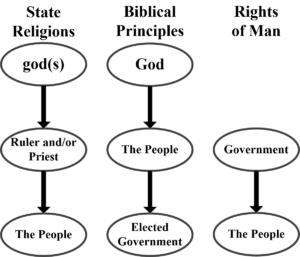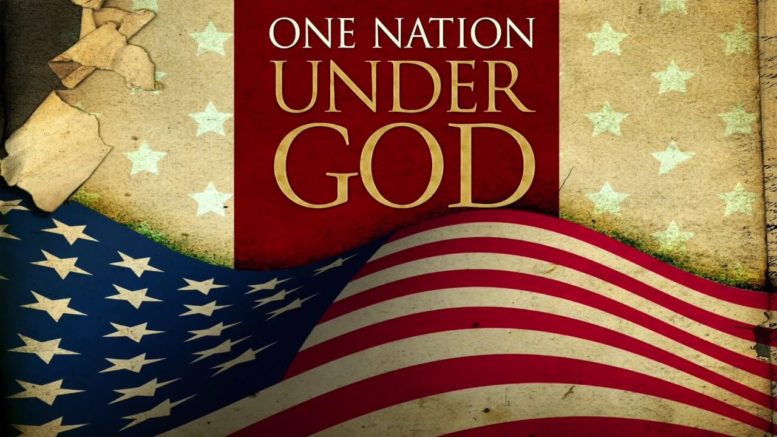Reprinted from livingrightly.net
This series about liberalism’s differences from Christian principles ends examining man’s dominion in the areas of creation, family, society, and governance. It closes with one final implication from man creating his own values.
Dominion is simply authority. God, as the creator of everything that has ever been created, is creation’s governor. It all belongs to Him, and His authority is absolute. However, a ruler can grant another their authority. But the one to whom authority is given doesn’t own whatever they’ve been given authority over. Instead they owe a responsibility to care for what has been entrusted to them—the duty of stewardship.
This dominion is further evidence of God’s goodness. He has provided for us. In fact, one of God’s names is Jehovah-jireh—God will provide. He has not only given us existence, but the means to support it. This too, is a matter of grace, God’s love for us.
Again, none of this is about people, groups, or parties. Instead it is about ideas as those are what truly matter.
Creation
Several biblical passages point to man being given dominion over God’s creation.[1] Man owns none of it, including the land. But he is to use it to meet his needs. The argument for man’s dominion is rooted in two ideas. The first is God’s authority noted above. The second is God’s will for man to voluntarily obey Him, do good, and serve one another in love.
There are two ways man belongs to God. The first is voluntary on our part and was just noted above, our choice of whether to obey God’s will. The other is through man’s being part of creation itself. In this second way man has no choice, he belongs to God. We have a duty to care for others, but the choice to obey is ours to make. We are accountable for that choice whether we choose to accept it or not.
As man was given dominion over creation, he has the right to keep the fruits of his labor. With this dominion comes the responsibility to care for creation—the stewardship mentioned above. We discussed charity in the previous article. Stewardship can be thought of as a form of charity across time. Each generation’s choices impacts future generation’s ability to provide for themselves. While we are to enjoy what we produce, we are not to become attached to it. Instead we are to share with others in need. Wealth itself is not bad, it is our choices as to what we do with it that make all the difference.
Family
The family is the earliest relationship where man was given dominion. First, all man shares the same kinship as all are descended from Adam. That is the basis for our shared nature. Second, God is love. God is also Triune; consisting of the Father, Son, and Holy Spirit. Three persons within one nature. There is community, and therefore the capacity for love. The relationship man and woman are to have in marriage is to be similar to the love between the three persons of the Trinity. We are to become of one flesh through our love, even though we are two persons. This is also a very dim image of God’s love, but it is also true that there is nothing else closer to it in all creation.
Man is finite. He must have children to effectively continue exercising his dominion. As children are not born with knowledge or possessing virtue, they must be educated. This education is the parents responsibility. Government provided public education is a pagan notion. It is only by our efforts to acquire virtue and become good that we remain effective stewards. Again, it is not just about the ends, but the means used to attain them.
Education is only one way we are to provide for our children. We are also to give them the material and spiritual things necessary to grow into healthy citizens capable of fulfilling their purpose. While our family is to be our foremost duty, it is not the only one. Each generation is to see the next receives the necessary instruction to be successful. It is also up to the next generation to choose whether or not they will accept that duty, a choice they are accountable for.
Society
In many ways the dominion given to man for society is just an expansion of that for the family. We are not only called as individuals, but to be a single people—God’s people.[2] To be a people requires acknowledging both a single set of rights and shared commitment to the common good. Both charity and justice are virtues supporting the common good. The first amounts to doing good for others, the second an accounting and restoration when someone chooses to do wrong.
When Moses led the Israelites out of Egypt, he was their judge and his brother Aaron chief priest. There was separation between governing and religious power from the beginning. Each power had a separate purpose, both were fully present and fully active at the same time. Governance to see that justice was impartially and even-handedly carried out, and religious to teach the people God’s requirements for right living and properly conducting worship. Society’s leaders served God by serving His people.
God or Man?
There are significant differences between society’s built upon God’s principles and those choosing man’s values. Within society’s based upon God’s principles, God is king and society’s primary purpose is to enable man to fulfill his purpose through grace by loving Him and our fellow man. Man’s equal nature is to be recognized through laws applied impartially to all. Governance exists to serve the people, primarily by promoting justice.
Within society’s based upon man’s values, society’s primary purpose is to perpetuate itself as embodied by the State. The people exist to serve society itself—that is, man. Some are meant to rule and others to be ruled. Man’s nature is not equal as some skills and abilities benefit society more than others. Laws are to apply to the people based upon the State’s needs to perpetuate itself. Modern variations of this model, based upon philosophies developed during the Renaissance and Enlightenment, put religious power beneath political power.[3]
The diagram below illustrates these differences. The ancient Roman, Greek, Egyptian, Babylonian, Mayan, Incan, and Aztec civilizations are examples of State Religion societies. Societies where man made their gods. Its modern counter-part is the Rights of Man society. In this latter model no God appears as governance is unencumbered by God’s influence, a corruption of the biblical principle of separation between political and religious power.

Our nation was founded upon biblical principles. Such a society is contrary to and incompatible with either society based upon man’s values. They cannot coexist.
Governance
The previous section stated governing’s primary responsibility is to see justice is even-handedly and impartially executed. This includes both protecting our rights and seeing that one receives their due when their rights are violated. But justice is a virtue. Virtue will not exist in leaders if it does not exist in the people, because the leaders are to be selected from the people itself.
Our right to justice is derived from two ideas. First, we share the same nature as we were all derived from the same individual. We therefore should all be treated equally with respect to our rights and duties. Second, we are each responsible for the choices we make. Even choosing not to do something is a choice. When we make bad choices, we should be accountable for them simply because it is the right thing to do.
Justice is a second side supporting the common good, charity was the first. Charity supports the common good by providing another with what they need both spiritually and materially from our abundance. Justice serves to discourage unjust behavior through punishment and restitution when man decides to do wrong.
All are called to obey God, including our leaders. The one who wishes to lead is to be servant of all.[4] This requires some special characteristics, virtues such as; honor and fortitude, stability in firmness, fidelity, and piety in the exercise of authority.[5] Leaders are to create an environment where we each are able to fully exercise our rights and perform our duties.
Man Creating His Own Values
When man turns away from God, he creates an environment contrary to his purpose. More importantly, the nature God gave man will no longer be recognized. Man puts aside his humanity, making himself no different from the rest of nature. Man’s reason no longer has its God-given basis or purpose. There is no longer faith, and without faith there can be no hope or charity. Without these, there can be no virtue. Man will have conquered all, only to lose everything—including himself.
An Example
This series has outlined five implications for man creating his own values. So far it has been theory. Let’s use an example. Take marriage. According to biblical principles, marriage is a relationship where one man and one woman join themselves to one another, becoming of one flesh. Man wishes to change that value to marriage being a relationship between two consenting people, regardless of their sex. But why that value?
Why not marriage between more than two people? Shouldn’t we allow anyone to marry, regardless of their age or mental competence? Why should it matter whether they are related or not? Finally, why should we limit marriage to being only between people? What makes any one of these values better than any other? What standard can man point to providing an objective basis for his choice? The truth is, there isn’t any. Man relying on his own values becomes driven by emotions, what he wants.
When cut loose from God’s morality, marriage becomes a value empty of content, a mere label. Does all man want the same thing, to the same degree once he’s created his own values? No, there’s no evidence supporting that position. After all, if this were true man would likely want only one type of house, one type of clothing, or one type of bread. Such is not the case.
Reason or Sentiment
It comes down to reason and objective universals versus emotions and subjective sentiment. Both Plato and Aristotle believed in objective universals such as right and wrong, good and evil, true and false. Universals to be directed by the State. On the other hand, for Christians universals come from God. His universals do not change. They are timeless because God exists outside of time. For man to fulfill his purpose, he must exist and act within God’s values. Seventy percent of America’s population professes to be Christian. This should be a slam-dunk decision. So why the division? Division if the fruit of man turned from God.
Ever wonder why the left today tries to get everyone so jacked up with emotions? When man creates his own values, he is simply relying on emotion. God’s image—reason—loses its value as well. This emotion is nothing but sentiment, even though man uses it as an objective value—an exercise in illogic. C.S. Lewis said the following about such a state. “No emotion is, in itself, a judgement; in that sense all emotions and sentiments are alogical. But they can be reasonable or unreasonable as they conform to Reason or fail to conform. The heart never takes the place of the head: but it can, and should, obey it.”[6] Emotions only have content if they are connected by reason to objective values—that is, God’s values.
The values we choose matter. They determine whether education serves to propagate man toward fulfilling his purpose, or is merely propaganda. This series purpose has been to present your true choices, not liberalism’s false ones. Not to tell you what to think, but instead to love you with the truth.
Footnotes:
[1] See for example, Genesis 9:3-6, Leviticus 25:23-4, and Matthew 6:25-30.
[2] See 1 Peter 2:9-10.
[3] Wolf, Dan, p. 105, A Handbook of Natural Rights, living rightly publications, 2018.
[4] See Mark 10:41-5
[5] Ibid, p. 118.
[6] Lewis, C.S., p.19, The Abolition of Man, HarperOne, 2001.




